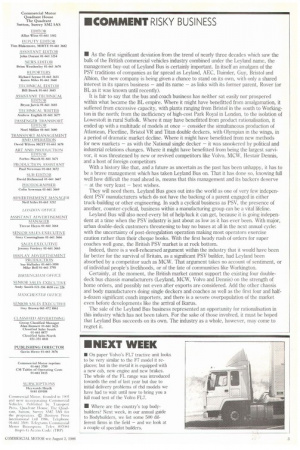'COMMENT RISKY BUSINESS • As the first significant deviation from
Page 5

If you've noticed an error in this article please click here to report it so we can fix it.
the trend of nearly three decades which saw the bulk of the British commercial vehicles industry combined under the Leyland name, the management buy-out of Leyland Bus is certainly important. In itself an amalgam of the PSV traditions of companies as far spread as Leyland, AEC, Daimler, Guy, Bristol and Albion, the new company is being given a chance to stand on its own, with only a shared interest in its spares business — and its name — as links with its former parent, Rover (or BL as it was known until recently).
It is fair to say that the bus and coach business has neither sat easily nor prospered within what became the BL empire. Where it might have benefitted from amalgamation, it suffered from excessive capacity, with plants ranging from Bristol in the south to Workington in the north; from the inefficiency of high-cost Park Royal in London, to the isolation of Lowestoft in rural Suffolk. Where it may have benefitted from product rationalisation, it ended up with a multitude of models at once — consider the simultaneous production of Atlantean, Fleetline, Bristol VR and Titan double deckers, with Olympian in the wings, in a period of dramatic market decline. Where it might have benefitted from new methods for new markets — as with the National single decker — it was snookered by political and industrial relations changes. Where it might have benefitted from being the largest survivor, it was threatened by new or revived competitors like Volvo, MCW, Hestair Dennis, and a host of foreign competitors With a history like that, and a future as uncertain as the past has been unhappy, it has to be a brave management which has taken Leyland Bus on. That it has done so, knowing full well how difficult the road ahead is, means that this management and its backers deserve — at the very least — best wishes.
They will need them. Leyland Bus goes out into the world as one of very few independent PSV manufacturers which do not have the backing of a parent engaged in either truck-building or other engineering. In such a cyclical business as PSV, the presence of another, counter-cyclical, business within a manufacturing group can be a vital lifeline.
Leyland Bus will also need every bit of help/luck it can get, because it is going independent at a time when the PSV industry is just about as low as it has ever been. With major, urban double-deck customers threatening to buy no buses at all in the next annual cycle: with the uncertainty of post-deregulation operation making most operators exercise caution rather than their cheque books. With the first heady rush of orders for super coaches well gone, the British PSV market is at rock bottom.
Indeed, there is a well-rehearsed argument within the industry that it would have been far better for the survival of Britain, as a significant PSV builder, had Leyland been absorbed by a competitor such as MCW. That argument takes no account of sentiment, or of individual people's livelihoods, or of the fate of communities like Workington.
Certainly, at the moment, the British market cannot support the existing four doubledeck bus chassis manufacturers (Leyland, MCW, Volvo and Dennis) on the strength of home orders, and possibly not even after exports are considered. Add the other chassis and body manufacturers doing single deckers and coaches as well as the first four and halfa-dozen significant coach importers, and there is a severe overpopulation of the market even before developments like the arrival of Ikarus.
The sale of the Leyland Bus business represented an opportunity for rationalisation in this industry which has not been taken. For the sake of those involved, it must be hoped that Leyland Bus succeeds on its own. The industry as a whole, however, may come to regret it.












































































